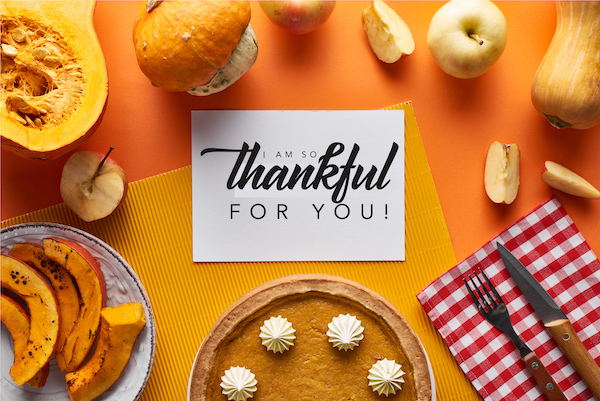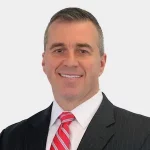 With another Thanksgiving holiday upon us in the United States, we once again asked the IP community to chime in with what they have been grateful for in the realm of IP for 2023. We received comments from more than two dozen practitioners who mentioned almost as many unique topics for which they are thankful. From movement on AI and IP protection to pending patent eligibility and Patent Trial and Appeal Board legislation and big trademark wins this year, read on to hear what IP stakeholders are giving thanks for.
With another Thanksgiving holiday upon us in the United States, we once again asked the IP community to chime in with what they have been grateful for in the realm of IP for 2023. We received comments from more than two dozen practitioners who mentioned almost as many unique topics for which they are thankful. From movement on AI and IP protection to pending patent eligibility and Patent Trial and Appeal Board legislation and big trademark wins this year, read on to hear what IP stakeholders are giving thanks for.
Thank you all from IPWatchdog, and Happy Thanksgiving!!
I AM THANKFUL FOR:
SEPs Staying Safe, for Now
 Alden Abbott
Alden Abbott
Former FTC General Counsel; Senior Research Fellow
Mercatus Center at George Mason University
We should be thankful that the Biden Administration has not released a new statement of policy “recommending” a framework for negotiating [standard essential patent] SEP licenses. Private negotiators should be free to negotiate licensing agreements as they see fit, consistent with existing positive law — they know better than government what works best. In this area, government cannot know the factual circumstances that affect individual contract negotiations — to suggest they are better able than the private sector to orchestrate negotiations reflects the bureaucratic “pretense of knowledge” that Friedrich Hayek warned against. Let us hope that US Government officials keep Hayek’s admonition in mind during 2024.
The Supreme Court Getting It Right, Sometimes
Alan Behr
Phillips Nizer
We can be grateful this year that, despite all of the concerns about an ideologically divided Supreme Court, when it came to IP cases, the Court has recently provided a rational consensus. In Jack Daniels Properties, Inc. v. VIP Products LLC, the Supreme Court wisely said that enough is enough with trademark infringers hiding behind the defense that ordinary commercial products are works of artistic expression. In Andy Warhol Foundation for the Visual Arts, Inc. v. Goldsmith, the Court was asked whether some of the works by Warhol that derive from a photograph used without authorization actually infringe on the photos. Answer: they sure do.
Most of all, IP lawyers can be grateful that AI has not yet taken our jobs.
Copyright Guidance on AI
Sarah E. Bro
McDermott, Will & Emery
As we are now all practicing at the intersection of AI and IP, I am grateful for the U.S. Copyright Office’s March 2023 Registration Guidance: Works Containing Material Generated by Artificial Intelligence, which provides straightforward guidance on the registration of works containing AI-generated content, including specific steps for making necessary disclosures in copyright applications. I am excited to think about all that lies ahead for IP practitioners to learn – and the ways in which we can lead – in the legal landscape relating to AI and IP.
New Trademark Proceeding Sees Success
 Peter Byrne
Peter Byrne
Morgan Lewis
I am grateful for the implementation of the expungement procedure that was created by the Trademark Modernization Act. Through this relatively new mechanism, interested parties may petition the USPTO Director’s Office to request cancellation of some or all of the goods and services in trademark registrations between three and ten years after registration on the ground that the registrant has not used the trademark in commerce. An expungement petition is a less expensive alternative to filing a Petition to Cancel with the TTAB. This year, I had success using the procedure to clear a registration that the registrant tried to maintain in bad faith. During that process, I was heartened by my interactions with the Examining Attorney, who was willing to work with practitioners like myself to develop this new process. Particularly in view of the flood of dubious trademark applications filed during the pandemic, I am optimistic that the expungement petition will become an increasingly helpful tool for clients that need to clear dead weight from the Register to secure their own trademark rights.
Status Quo in the UK
Trevor Cook

 , Richard Vary and Nick Aries
, Richard Vary and Nick Aries
Bird & Bird
For 2023, the IP community in the UK can be thankful for a thriving IP landscape demonstrating the UK’s continuing importance in the global IP community. Three examples stand out:
The first is the extremely limited changes, essentially only as to tidying up, made to IP law by the Retained EU Law (Revocation and Reform) Act and the measures enacted under it. Given the degree to which the last 50 years of UK IP legislation reflects EU law (as to which the UK had a major input) any other course would have been enormously disruptive.
The second is the existence of prominent, cutting-edge IP litigation going through the UK courts. These include COPA v Wright, a high-profile case being heard early next year regarding the identity of Satoshi Nakamoto (the pseudonymous creator of Bitcoin) and the ownership of Satoshi’s IP rights.
The third is the UK not being part of the EU’s proposed SEP Regulation. If enacted as currently proposed, the prohibition in the proposed Regulation from starting an action in European courts or the UPC without having gone through a non-binding process that may take nine months or more may well mean European technology companies with large SEP portfolios will favour the UK courts over their European counterparts for resolving large-scale SEP disputes.
Lessons in the Federal Circuit
Matthew Dowd
Dowd Scheffel PLLC
About 100 years ago, in 1926, Felix Frankfurter detailed how, since the Judiciary Act of 1891, “the movement for a centralized patent tribunal grew apace.” The Act created the circuit court of appeals; patent cases were thus no longer appealed directly to the Supreme Court. Frankfurter, later to become a Supreme Court Justice, explained that “[u]niformity was thus replaced by the threatened diversity of nine appellate courts of coordinate jurisdiction.” He concluded, however, that a “centralized patent tribunal” was not needed because the appeals courts had “acquired increasing skill in patent litigation and have consciously sought harmony in patent adjudications.”
Frankfurter’s insight was overly optimistic. Over the next five decades, outcomes in patent litigation grew to be dependent on where a case was litigated. That led to the judicial innovation for which we should all be thankful: the Federal Circuit.
Now just over 40 years old, the Federal Circuit continues as the nation’s innovation court. Under the extremely able leadership of the court’s eighth chief judge, Kimberly Moore, the court has announced a wonderful initiative to continue renovating the historic Dolley Madison House to create a center for students to learn about the court’s important role in innovation and other matters of national and historical significance, including space monkeys.
The court also continues to support the Annual Friedman Lecture on Excellence in Appellate Advocacy, in honor of the late Daniel M. Friedman. For those who attended this year’s lecture, we had the pleasure of learning from Judge William Bryson, who gave one of the most engaging and informative talks, touching on Judge Friedman, Justice Thurgood Marshall, John W. Davis, and appellate advocacy in general.
The court is, as we know, facing challenges, including how to improve innovation law in the era of the America Invents Act. For the moment, though, let’s give thanks for being fortunate enough to have such an important judicial innovation.
District Court Verdicts
Aaron Fahrenkrog
Robins Kaplan LLP
Inventors and patent owners should express gratitude and optimism for one noticeable trend in 2023 that should continue into 2024: patent cases going to verdict in the U.S. district courts. When cases go to trial, inventors and patent owners have the opportunity to protect their investments in inventions and intellectual property. Over the last 15 years, patent owners have faced many new hurdles they must clear to get to trial, including increased scrutiny of damages theories and evidence, expanded categories of inventions considered “abstract ideas” ineligible for patent protection, near-guaranteed challenges to the validity of asserted patents in the Patent Trial and Appeal Board, growing use of early motions under Rule 12 to dismiss patent cases, and decreased venue options. Patent owners have risen to meet these challenges, and 2023 produced many notable damages verdicts for patent owners in the U.S. district courts, reinforcing the United States as a leader in protection for investments in invention and innovation. The busiest trial courts have many more trials queued up for 2024. Much more to look forward to going into the new year.
Trademarks and the First Amendment
Dyan Finguerra-DuCharme
Pryor Cashman
I am thankful for the continued development of jurisprudence concerning the balance between the First Amendment and the enforcement of trademarks. 2023 saw many different contexts in which the First Amendment clashed with federal trademark law, with many decisions favoring trademark law over the First Amendment defense. In a case involving parody, SCOTUS set some limits on the reach of Rogers v. Grimaldi — in Jack Daniels, SCOTUS determined that the Rogers test does not apply where the alleged parody is used specifically as a trademark. The district court in Yuga Labs also took aim at the First Amendment / Rogers defense, finding that defendants’ sale of NFTs does not express artistic ideas or critical commentary. SCOTUS has another opportunity to assess the balance between the First Amendment with trademark law when it rules this winter on whether the U.S. Patent and Trademark Office’s refusal of registration of the phrase TRUMP TOO SMALL (for use on apparel) violates the free speech clause. The Trademark Office’s decision was upheld by the Federal Circuit based on federal law that prohibits registering a mark that identifies a living individual without the person’s consent. The Supreme Court will determine whether the federal law violates the First Amendment when the mark criticizes a public or government official or whether the law is a reasonable restriction protecting individual and consumer rights.
Advocates for Independent Inventors
Jeff Hardin
NavigationIP.com
As Thanksgiving approaches, my heart is filled with gratitude. I reflect on the incredible individuals at IPWatchdog—Gene, Renee, Eileen, Steve, and many more—who played a vital role in making IPWatchdog LIVE 2023 a reality. Engaging with brilliant minds in the ever-evolving realm of patents was truly enriching.
I’m also thankful for our government’s recognition of the importance of supporting underrepresented inventors. There’s hope that the focus will shift towards addressing the genuine challenges faced by these inventors.
Moreover, witnessing a positive shift in rhetoric towards patent owners is encouraging. Inventors advocating for stronger rights is a testament to their resilience. Despite the challenges posed by certain policies, I’m grateful to live in a nation where laws can be amended by the people. It’s heartening to see some members of Congress acknowledging the real stories of inventors and taking steps to address unintended consequences.
This Thanksgiving, I extend my deepest appreciation to everyone who advocates for and contributes to the success of the inventor community, and to those working towards a more supportive environment for inventors and our voice.
The Promise of Patent Eligibility Progress
Phil Harris
Holland & Hart
This year, the IP Community is thankful for the Promise of Progress for patent eligibility under Section 101. Since Alice in 2014, and other decisions, the Supreme Court has denied dozens of petitions on patent eligibility and the lack of clarity is stifling invention. We’re thankful for Senators Tillis and Coons introducing the Patent Eligibility Restoration Act of 2023. Although imperfect, this legislation at least aims at protecting American innovation and progressing the coordination between various stakeholders by having a strong, defined framework. We’re hopeful this legislation, and the relevant discussions surrounding it, will allow for the protection of artificial intelligence (AI) implementations and technology, among other key technology areas, which are and will continue to be critical.
We’re also grateful for those who have supported, and opposed, patent eligibility reform with an eye toward finding a solution—in contrast to the current patent eligibility fog that clouds decision making. Many key figures—such as Retired Judge Paul Michel, along with former USPTO Directors Andrei Iancu and David Kappos—continue to advocate for change and concrete improvement in this critical area of IP.
And, we’re thankful for the companies that continue to advance innovation and development of life-altering and life-improving technologies.
Perhaps most of all, the IP Community is thankful for the innovators—the inventors and the designers—who through their human ingenuity develop and deepen the knowledge and know how that promises such progress as we head into 2024.
PERA and PREVAIL
Scott Hejny
McKool Smith
This past year has been a time of continued uncertainty for intellectual property owners, but I’m thankful that there are those in Congress that are looking to maintain the value of American ingenuity as the country continues its battle to maintain technological supremacy. I’m particularly thankful for Congressional leaders that are taking a close look at critical issues, like patent eligibility, and steering the Patent Trial and Appeal Board (PTAB) in the direction that was intended with the enactment of the America Invents Act (AIA). Guidelines need to be established to level the playing field when it comes to the intersection of district court litigation and PTAB proceedings, and we’re seeing proposals, such as the PREVAIL Act, that are trending in that direction. I’m also thankful for PTAB leaders like Derrick Brent, Deputy Director of the United States Patent & Trademark Office, who I was fortunate to interview this year, and who is a dynamic figure with years of experience in all three branches of government that can help steer the Patent Office towards improved quality, equality, and inclusiveness.
Wendy Verlander
Verlander LLP
I am thankful for the PREVAIL and PERA Acts that have been introduced by Congress. Patents have been invalidated at alarming rates at the PTAB and through patent eligibility challenges over the past decade. The resulting uncertainty in patent protection has severely impacted the motivation for inventors to innovate and for financing innovation in this country. We have seen a steep decline in patenting relative to other countries at a time when innovation is critical to our economy. These Acts address many of the intractable problems. Among other things, the PREVAIL Act addresses the disparity between IPRs and district court actions that have resulted in many more patents being invalidated at the PTAB than at district court. The PERA Act eliminates the judicially-created exceptions to patent eligibility that have confounded litigants and judges alike. Let’s hope 2024 brings the passage of these two bills and patents in this country can once again enjoy the value they once held.
Legal Development Training
Brian Johnson
Axinn, Veltrop & Harkrider:
I am thankful for the continued expansion and use of programs aimed at promoting young attorneys. One of the many challenges created by the pandemic has been training. Law firm attorneys generally spend their formative years working closely with more senior attorneys and learning the skills to succeed. Yet, for those that began recently, many spent those years working remotely. It wasn’t the same.
Fortunately, new opportunities for training have come from an unlikely source: the courts themselves. A few years ago, the [Patent Trial and Appeal Board] PTAB launched its Legal Experience and Advancement Program (LEAP) designed to provide opportunities for new practitioners to obtain oral argument experience before the Board. The program incentivized use by offering additional argument time for qualifying young attorneys who took a prominent argument role. Then, last year, the International Trade Commission (ITC) rolled out the Nurturing Excellence in Trial Advocates (NEXT Advocates) program with similar goals and incentives in mind. And just this year, the ITC Trial Lawyer Association held its inaugural mock hearing program, where young lawyers got the opportunity to conduct direct and cross-examination before the administrative law judges and receive feedback. This is a great trend that I hope expands and flourishes in 2024!
Those Who Stand Up for What’s Right
 Sherry Knowles
Sherry Knowles
Knowles Intellectual Property Strategies
I am deeply thankful for our brave colleagues in the patent bar and patent advocates who are willing to stand up to support innovation and innovators; for those who are willing to volunteer their time to speak, write, and organize to defend the wording of statutes as passed by Congress and to fight against the creep of substantive judicial and administrative patent law-making. And I am abundantly thankful for leaders who speak out just because it is the right thing to do to support and motivate new healthcare inventions that can save or improve lives, as well as those who speak against the false narrative that pharmaceutical patents hurt people. I also remain grateful to those who lead the discussion on the misuse of the tax code to create an unbearable penalty to force corporate involuntary submission, as seen in the Inflation Reduction Act. Blessings to you who strive to make a difference.
Deference to IP Offices on AI IP Fixes
Sarah Kohn
 and Luke Lynch
and Luke Lynch
ACG Advocacy
We are thankful for the recent White House Executive Order on AI and its decision to defer to the U.S. Copyright Office (USCO) and U.S. Patent and Trademark Office (USPTO) on relevant IP and copyright issues. IP and copyright issues are some of the most pressing questions surrounding AI. Developing guidance and other appropriate resources to assist private sector actors with mitigating the risks of AI-related IP theft is a very welcome statement for members of the IP community. Both the USCO and USPTO have been working on AI-related issues this year and have actively solicited public feedback on these issues. They are well-equipped to answer these complex questions. We are excited to see the resulting reports from both agencies and we hope to see that the Three C’s (Credit, Consent, and Compensation) are respected, especially for those in IP-related industries.
Emergent Technologies
Daryl Lim
Penn State Dickinson Law
I am thankful for the advances in AI and the steady development of the rules governing them. ChatGPT 4 and its generative AI kin are more mainstream than ever, including in law practice. AI eligibility rules are also more settled. Developers and users know they need to insert a human element in the creation or innovation chain for the output to be eligible for copyright or patent protection. The Biden Administration’s Executive Order on the Safe, Secure, and Trustworthy Development and Use of Artificial Intelligence is the latest signal that American policy favors a light touch, working with developers and the market, rather than imposing heavy-handed, omnibus regulation on businesses.
Sam Altman’s seamless transition from OpenAI-ouster to his soft landing at Microsoft and reinstatement portends a future that favors accelerating growth over the apocalyptic warnings from ‘doomers.’ Some may also auger the end game for current battles over infringement and fair use of text and data mining between generative AI companies and content providers from the Altman saga. America will lean in a different direction from Europe and China and the rest of the world will pick and choose approaches that fit their needs. With every new wave, those who fail to upskill and remain relevant will be swept aside by evolution. The key is not to hold back the tide and risk being left behind but to equip the willing and able to find new ways to generate value and share its benefits as equitably as possible.
Post-COVID Court Processes
Courtland Merrill
Saul Ewing
I am thankful at how far our federal courts and Patent Trial and Appeal Board have come to returning to pre-pandemic routines and processes. 2022 was still very much a year influenced by pandemic protocols. By 2023, district courts across the country have returned to holding in-person hearings where appropriate, but also keeping what we learned about remote hearing technology. I am thankful for this year’s return to normalcy while appreciative of the improvements we have made to the process.
Government Contract Improvements for SMEs
Gabrielle Morlock
Snell & Wilmer
I am thankful that the Department of Defense (DoD), General Services Administration (GSA), and National Aeronautics and Space Administration (NASA) have proposed to amend the Federal Acquisition Regulation (FAR) to implement changes related to data rights in the Small Business Administration’s Policy Directive for the Small Business Innovation Research (SBIR) and Small Business Technology Transfer (STTR) Programs. I believe this change will help address some of the challenges many startup and small businesses face when working in the realm of government contracts. See FAR Case 2020–010. Particularly, the amendment would change the FAR so that it complies with SBA’s SBIR and STTR policy directives published in the Federal Register on April 2, 2019 (84 FR 12794). This was a huge, and well welcomed change that provided for uniformity and clarity related to Government rights in SBIR/STTR data, extending the SBIR/STTR data rights protection period from 4 years to 20 years. Through these changes, specifically the clarity in the protection of IP for the benefit of small businesses, we hope to see fostered growth and participation of small businesses in these government contract programs. Start-ups are a large part of the growth and prosperity of my local community, and I am thankful for the changes being made to support their development.
Jury Trials
James Perkins
Cole Schotz
I am thankful for the right to a jury trial. Litigating patent cases, we don’t get the opportunity to exercise that right on behalf of our clients very often, especially compared to attorneys practicing in other fields. Having recently tried a case in front of a jury, I was reminded how lucky we are to have the right to present our client’s arguments to a jury of their peers and have them resolve the parties’ disputes. The judge in our case allowed the jury to ask questions of all the witnesses after the parties were done with their questioning. I was impressed by the quality of the jurors’ questions and how they illuminated the issues that they wanted to know to resolve the case. Many of their questions were not as obvious to the parties and the attorneys or the court who had lived with the case for years, and it was a huge benefit to everyone that those questions were addressed directly by the witnesses during trial. During discussions with the jury following trial, they were all so grateful to have had the chance to participate as jurors in the constitutional right to a jury trial that we all have. It made them proud to be an American, and I felt the same way. We are blessed in this country to have the right to a jury trial, and even though we do not get to exercise that right for our clients very often, we should not take it for granted.
‘Brand Action’
Tom Polcyn
Thompson Coburn
As we get ready to celebrate another Thanksgiving holiday in the United States, I am thankful for the many compassionate trademark professionals around the world that have come together and leveraged their influence and resources to support Brand Action and its worthy and continuing mission to help those in need. For more than 25 years, I’ve been involved in INTA, the world’s largest international association of trademark lawyers. It’s a truly unique global community of trademark professionals who share a sense of camaraderie, international perspective, and reliance on partners and friends in other nations to serve clients. In the spring of 2022, a small group of INTA members formed Brand Action as a non-profit organization whose purpose is to give the many compassionate professionals in our trademark industry a place to help our friends when their peace and stability are threatened, or when natural disasters strike. In less than two years, Brand Action has raised over $150,000 through fundraising initiatives that support the work of highly vetted charities that are feeding people impacted by crisis in Ukraine, Turkey, Syria and Mexico, among others, and delivering sorely needed medical supplies to the frontline and hospitals within Ukraine. Brand Action’s work has already made a huge impact, and they’re just getting started.
Government and Judicial Action on AI
Karen Sebaski , counsel, Holwell Shuster & Goldberg LLP:
, counsel, Holwell Shuster & Goldberg LLP:
This year, I am thankful that, as artificial intelligence technology becomes increasingly sophisticated and more widely utilized, the federal government and key government agencies are taking steps to develop legal frameworks to advance private-sector use of AI, including to facilitate innovation and guard against the potential harmful effects of such tools. In October, for example, the President issued an Executive Order on the Safe, Secure, and Trustworthy Development and Use of Artificial Intelligence, which includes milestones for the Undersecretary of Commerce and USPTO Director to develop guidance on patentability and use of AI in the inventive process, as well as milestones for active steps in connection with a forthcoming study by the Copyright Office on issues such as the scope of copyright protection for AI-generated works and use of copyrighted content to train AI algorithms. These issues are just the tip of the iceberg when it comes to AI, and I look forward to seeing what 2024 has in store for this fast-developing technology and the myriad of accompanying legal issues for IP law and beyond.
Howard Shire
Troutman Pepper
The IP community has a lot to be thankful for in 2023, mainly due to the seemingly never-ending fascinating and cutting-edge IP issues presented primarily by modern technology. Issues posed by artificial intelligence (“AI”) are at the forefront.
These probably start with whether the basis for AI, namely the fact that it is based on using pre-existing copyrighted material, is lawful. Does this use constitute copyright infringement or does it qualify as fair use? There are pending cases presenting this issue, which will probably make their way through the court system in 2024. Or perhaps Congress will weigh in, via an amendment of the Copyright Act.
What about the materials created by the use of AI? Thus far, the Copyright Office has indicated that they are not copyrightable unless there is some degree of human involvement, but how much involvement is unclear. Perhaps court cases will shed some light on this in 2024.
Apart from AI, I look forward to the Supreme Court’s first decision involving Section 2c of the Lanham Act, which prohibits registration of a trademark using the name of a living person, without that person’s consent. Steve Elster applied to register the trademark “Trump Too Small” for t-shirts. Elster claims that his trademark is intended to convey that some features of President Trump and his policies are diminutive. The application was denied by the Trademark Office based on 2c, but the Federal Circuit approved of the application, because prohibiting Elster from registering this mark would violate the First Amendment. Based on oral argument earlier this month, it appears likely that the High Court will uphold the statute and deny Elster’s application, based on 2c, but we shall see.
The People!
Jonathan Stroud
Unified Patents
We all have so much to be thankful for—not the least being intellectually stimulating careers in a data-driven field full of good, intelligent people who are a joy to work with, for, and against. But I’m selfishly most thankful for being on the other side of the pandemic and being able to travel around and see all the old friends and acquaintances I missed so much. It’s the people I’m most thankful for!

![[IPWatchdog Logo]](https://ipwatchdog.com/wp-content/themes/IPWatchdog%20-%202023/assets/images/temp/logo-small@2x.png)

![[Advertisement]](https://ipwatchdog.com/wp-content/uploads/2024/05/Quartz-IP-May-9-2024-sidebar-700x500-1.jpg)
![[Advertisement]](https://ipwatchdog.com/wp-content/uploads/2024/04/Patent-Litigation-Masters-2024-sidebar-last-chance-700x500-1.jpg)

![[Advertisement]](https://ipwatchdog.com/wp-content/uploads/2021/12/WEBINAR-336-x-280-px.png)
![[Advertisement]](https://ipwatchdog.com/wp-content/uploads/2021/12/2021-Patent-Practice-on-Demand-recorded-Feb-2021-336-x-280.jpg)
![[Advertisement]](https://ipwatchdog.com/wp-content/uploads/2021/12/Ad-4-The-Invent-Patent-System™.png)






Join the Discussion
2 comments so far.
Pro Say
November 22, 2023 05:28 pm“the Federal Circuit continues as the nation’s innovation court.”
— Mathew Dowd
The Federal Circuit continues as the nation’s innovation-killing court.
There. Corrected.
Pro Se
November 22, 2023 04:10 pmI’m thankful for 17 USC 101
https://www.yuandawinston.com